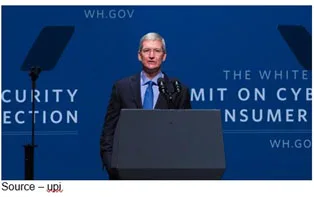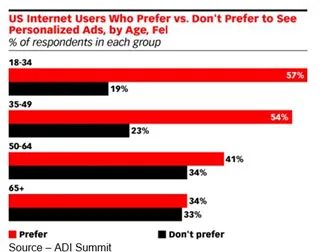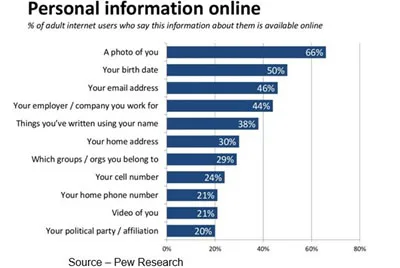With Half the World Online, Privacy is Probably Wishful Thinking

My wife has a time distortion problem.
Nothing serious, but when she grabs her phone or computer to look something up, inevitably we’ll hear, “I’ve been at this for hours and can’t find the darn thing!”
O.K., so she doesn’t say darn, and hours are really only minutes but…
But her attitude is the same as almost everyone’s on the Internet – tell me, find it, show me, get me there, give it to me … NOW!
Even after years of practicing reading her mind, it’s impossible for us.
So how can search engines, social media, websites anticipate her wants/needs without a little something to go on?
That, my friend, is the challenge/dilemma the industry faces when people demand privacy and personalization of stuff.
We live in a networked world and the internet is built for sharing things at a low cost.

You send emails, grab photos on your smartphone, posts/images about everything on everything, buy stuff online, stream content to the closest screen and do it all at little or no cost.
At the same time, you’re leaving a trail of data someone has to clean up.
Of course, you don’t have to provide that personal information; but if you don’t, what you really have is a rock or stick.
Throw it and it will:
- Stay
- Lie down
If you don’t supply all of that valuable personal information, it has no way of finding its way back to you with an answer or service.
People who collect that personal information really want to:
- Keep you coming back and keep you involved with them so they can learn more about you
- Sell you more stuff
- Make money
We know that sounds crass, but it’s true … there’s no such thing as a free lunch!
FAANG (Facebook, Amazon, Apple, Netflix, Google) all agree that privacy is a good thing, that the government should protect it, and that you can trust them to respect it.
Actually, what they want is to own the entire customer experience and be the first (and only) place you go for information, content, stuff.
Of course, they each define privacy differently.

Apple built its reputation on the Mac being more secure than Windows and offering a smartphone with strong device-level encryption—all while defining privacy as keeping your personal data between you and your device.
They don’t apologize for making their money on selling hardware even though they’ve decided selling services is more profitable but you’re still pretty safe if you stay in their walled garden.
Just don’t think too hard on where your data is actually stored.
Privacy has always been a sorta’ fuzzy concept for Zuck and Facebook.
They’ve committed to encrypting Facebook Messenger, Instagram and WhatsApp messages and encouraging roughly 2.4B folks to move from the town square to a private living room. But what’s the fun in that if the world doesn’t know of a person’s awesomeness and conquests?
That’s okay with them because they tried and all they’re really interested in is mining personal data to use so they can send you relevant ads and other stuff.

The search engine giant Google got religion after the EU (and a couple of countries) slapped them with respectable fines for not complying with the GDPR (General Data Protection Regulation) and other personal privacy regulations.
CEO Sundar Pichai told folks how they could adjust their settings to minimize or opt out of their collection/retention of personal data; and of course, very few bothered to use the changes.
That would mean folks would actually have to do something!
He was also quick to point out that the information they gather actually helps people, like when you’re driving from A to B. All that map and traffic data allows them to tell you what to avoid and how late you’re going to be.
Your data also helps them ensure you get ads from their partners that you might find of interest. In addition, the more information they collect and massage, the better job they’ll do of delivering better and better ads.
As for Netflix service the more data they collect and work with, the better job they’ll do at keeping subscribers. Their highly refined recommendation system instantly offers up content you really want to watch to keep you watching.
Netflix boss, Reed Hastings, once bragged that their only competition was sleep; but that was before every studio and network station in the world decided they wanted a bigger piece the action and took back their stuff to set up their own stores.
It doesn’t bother them that they’re starting from zero and:
- Netflix has 150M plus subscribers in 190 countries.
- People are proving they can only handle four-five subscriptions plus an ad-supported channel or two.
- There are tens of thousands of excellent Indie filmmakers around the globe very willing to fill their content roster with really good content at a very reasonable price.

The other guy who seems to keep all of the data his teams gather close to home and use it for “your” own good is Amazon’s Jeff Bezos.
Buy something from their store, BAM! they’ll deliver it.
Want to watch, listen to, read something? Done!
Need to store stuff? Yep!
Not sure? We’ll rummage through your data and “advise” you!
As long as these organizations’ data gathering activities deliver hyper-targeted advertising and content people want, most folks don’t care.

Young people – Gen Zs, Gen Alphas – have posted information, images, thoughts, ideas, requests online since they first got access to the Internet, which is pretty much since day one.
No one sits down with their device and does a data dump of everything about them, what they think, what they do, where they go … you know, everything.
Instead, the systems gather tidbits here and there and pretty soon there’s an excellent picture of who you are. As long as the system serves up what you want, when you want it and where you want it, individuals don’t mind.
Of course, that same information can be weaponized to keep you from seeing opposing views, information and images so you think, see the complete unabridged picture, analyze it and make decisions for yourself.
Yes, that can be uncomfortable.

The EUs GDPR could end the profiling and algorithmic decision-making of websites, content and service providers.
Several other countries and California thought it was such a good idea that they’ve developed their own versions of GDPR.
Social media and content services have looked around and realized they may have been “a little” too aggressive in their data gathering and usage and that restrictions are inevitable.

They also know it’s in their best interest if nations can agree with a common set of guidelines rather than customize limitations on a state by state, country by country basis on services that don’t really recognize borders and are global in nature.
The foundation of GDPR and other country/state proposals is that people will have a greater degree of control over how firms gather, store and use their personal data.
Fundamentally, who can disagree with the ability to control/manage your privacy?
At the same time, there are a lot of benefits to getting products and services that are tailored to your wants and needs.
Some claim it even gives an individual the right to be forgotten, which is really scary because it sounds lonely and with our time buried in our devices, we’re already alone together.
Online services aren’t sure what it will take to comply; and frankly, the people who wrote up the new proposals probably don’t either so there will be a long period of “I don’t know but I know it when I see it.”

Of course, it’s not as uncertain as China’s BAT (Baidu, Alibaba, TenCent) face which is basically you are allowed to operate in the country as long as you follow our guidelines.
Even the senior executives of the FAANG and smaller services agree that there have been and are abuses to personal privacy. So far, the abuses have been clumsy, overbearing efforts that have failed under their own weight.
People are providing more personal information to the services every day, and no company can keep track of everything.
Big data is getting bigger, analytics and AI are getting better and it’s impossible to predict where all of it will lead.
It could be better, and it could be a helluva’ lot worse.
The ultimate question is, if governments are supervising privacy and data collection, who’s supervising the governments?
 We certainly don’t have the answer, but we agree with Mae, “I’m most scared of unfulfilled potential.”
We certainly don’t have the answer, but we agree with Mae, “I’m most scared of unfulfilled potential.”
# # #